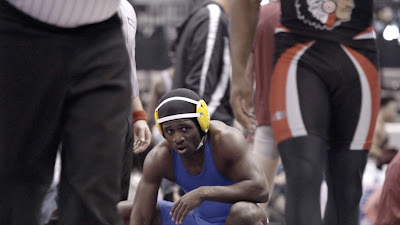From its first action-filled frames and the filmmakers' gracious nod to the inventor of basketball (
James Naismith) and what he hoped to achieve,
DOIN' IT IN THE PARK: Pick-up basketball, New York City, makes a great case for this played-everywhere-and-anywhere neighborhood game as THE be-all and end-all of sport love stories.
Further, as this tremen-dously entertaining documentary moves on, and we meet some of the great pick-up players, as well as some notable ex-NBA stars who talk about their own experience with pick-up basketball, it becomes increasingly clear that the filmmakers have stuck documentary gold.
Those filmmakers --
Bobbito Garcia (shown at left, from New York), who also wrote and narrates, and
Kevin Couliau (below, right, from France), who doubles as cinematog-
rapher -- have together come up with a movie that is boundlessly informative and almost as full of energy and surprise and any of those pick-up games they show us in the course of their film.
TrustMovies says this as someone who has rarely cared a fig about the sport. For those who already love it and/or play it, the film will be a must-see. In addition to the men (mostly black) who play these pick-up games, the movie includes a couple of talented white ones, along with one section on women who play and another on deaf players (who knew?) and what basketball has come to mean for our ever-growing prison population.
Over 90 days, which pretty much lines up with the three summer months, on 180 courts across the five boroughs of New York City, the filmmakers ply their trade, while discovering some relevant, funny and surprising things. "If we didn't have a ball or hoop, we'd use rolled-up socks and a wire hanger," notes one old-time player.
If another happened to arrive so early that no one else was there to play, "I'd play by myself, right hand against left hand, until somebody showed up!"
We learn all about the different pick-up games that are played -- from HORSE to 21 to something called Boots Up (above: "You won't find
this in the NBA!" we're told). Full of anecdotes, reminiscences, even some rap poetry and a lesson on the use of trash talk (below), visually the film is edited so fast with near-constant narration that you may find yourself a little out of breath. But you won't be bored.
The movie's also full of terrific archival film and photos (notice those
afros, below) and is sometimes very funny, too. "It was a home away from home," notes one player of his playground: "They used to change my
diapers in this park!" The filmmakers also show us the game as it sometimes is, with players leaving the court beaten -- and even bloody.
The best of all pick-up basketball locations, it turns out, is Manhattan's little vest-pocket playground on 6th Avenue at West 3rd Street, right across from the IFC Center. We spend a lot of time there, where we meet one of the most surprising of our men,
Jack Ryan, the white, 6-feet tall dunker (below) who is now 49 years old but hardly looks it and plays like a black man. "The best eight-letter name I've ever heard in my
life!" notes one of his co-players.
We learn about
Earl Manigault, aka the Goat, who is the only player to have had an actual park named after him, and was "the father of the neighborhood" until he got hooked on heroin and turned to crime to pay for his habit. (Filmmaker Garcia, who played pro ball for a time, was mentored by Manigault.)
Once the end credits have rolled, don't go away, for there's a five-minute segment in which we watch our two filmmakers play against each other in many of the parks around the boroughs. Really: This is one fucking
gem of a documentary.
Doin' It in The Park -- from
Goldcrest Films and running 82 minutes -- after a rousing success at festivals in foreign cities around the globe, opens this coming Wednesday in its home territory, New York City, at the
Maysles Cinema, as well as simultaneously being released in the UK. Its worldwide digital release took place at the beginning of the month, and it will have its World Tour, presented by Nike, from now through this coming August. (The movie soundtrack will be released on June 1st.)





















































